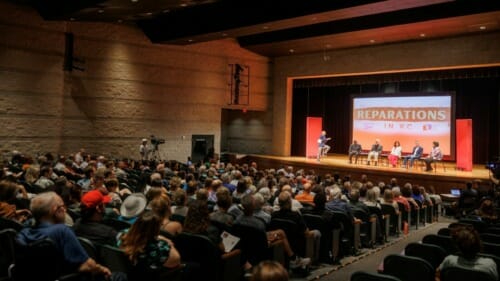Honoring Martin Luther King Jr. With Black Wealth Creation 'Is a Check Enough?'
Published January 12th, 2024 at 8:00 AM
Above image credit: Martin Luther KIng Jr. waves to supporters on Aug. 28, 1963, on the Mall in Washington D.C. during the "March on Washington." (Courtesy | Getty Images)Stark realities about racial wealth gaps in America will shape local discussions this year to honor Martin Luther King Jr.
The son of the late civil rights leader, Martin Luther King III, will take part Friday in a conversation during the Metropolitan Community College’s Chancellor’s Scholarship Luncheon. The sold-out event will feature King in a conversation with Lisa Ginter, CEO of CommunityAmerica Credit Union.
On Monday, the official MLK holiday, more events sponsored by the local chapter of the Southern Christian Leadership Conference (SCLC) will explore ways to close the gap between Black and white wealth accumulation.
One key message will be delivered by Ajamu Webster.
After Webster’s mother died in September 2010, the family began a financial journey that many others have faced.
As the executor of her estate, Webster, an engineer and a well-known leader within Kansas City’s Black community, began calculating his late mother’s wealth.
What happened next introduced Webster to concepts that he later used to shape the founding of Kansas City’s WeDevelopment Federal Credit Union, which opened in 2023.
Webster, who recently moved to Ghana, West Africa, will serve as the keynote speaker at the SCLC’s annual Martin Luther King Jr. Mass Celebration at 6 p.m. on Monday, Jan. 15, at Metropolitan Missionary Baptist Church.
The title of his talk is “Is A Check Enough?”
Webster wrote of his family’s experience in an essay for “From Redlining to Chalk Lines: The Costs of Economic Injustice,” the Urban League of Greater Kansas City’s 2023 State of Black Kansas City.
“This is Gloria Jackson Webster Pegues’ legacy and my first experience with generational wealth,” Webster wrote.
His mother’s estate included the value of the home she paid for through her wages as a postal worker, her savings, savings bonds, life insurance and more.
After everything was settled under her will, her three children were each to be given $14,000.
Those funds could have been used for their individual household needs, but one sister had a better idea. She suggested that educational funds could be set up for each of their mother’s seven great-grandchildren.
A decision was made. An investment of $6,000 was made into 529 college savings plans for each child. Moreover, each sibling committed to contributing $25 per month to the account of the eldest child.
Eight years passed.
When that eldest child frantically called the family, worried about how she would pay her freshman expenses at the University of Missouri-Columbia, the impact of their decision was revealed.
The fees were covered. The account had already grown to more than $28,000. This great-grandchild would later graduate debt free.
Moreover, the other children have followed in those academic footsteps.
Webster wrote his story with elders in the Black community in mind.
“Because of our lived experiences and leadership positions in our families, I’m convinced that elders must take the lead in generational wealth creation,” Webster wrote.
There is an underutilized aspect of the Black community, one that could be pivotal in generating greater wealth for future generations.
“As a people, we have a connection to our extended families and fictive kin that others experience only with their nuclear families,” Webster wrote.
Black families rank very high in charitable giving. Two-thirds of Black families donate to a charity every year, whether it is to a faith-based organization, mutual benefit associations, or hospitals.
Harnessing that generosity, and channeling it through investments, is a strategy that Webster advocates.
He ends one section of his essay with this: “It doesn’t have to be a fortune; it just has to be a blessing.”
Before Webster’s keynote address on Monday, a community forum will be held at 4 p.m. with members of the Mayor’s Commission on Reparations and the Kansas City Reparations Coalition. The forum will also be at Metropolitan Missionary Baptist Church, 2310 E. Linwood Blvd.
Besides the discussion, excerpts from the PBS documentary “The Big Payback” will be shown.
‘The Big Payback’
The racial wealth gap between Black and white families in the metropolitan area is stark. Black Kansas Citians have about 66% of the wealth held by white residents, according to figures compiled by the local Urban League.
Economics is one of the study areas of the Mayor’s Commission on Reparations, which was sworn in in May 2022 with 13 members.
Since that time, they have been meeting, both as study groups and as a full commission.
Besides economics, the other topics are health, homeownership, criminal justice and educational outcomes. The members are documenting harm caused to the city’s Black residents through actions that the city could be held responsible for committing. Eventually, the group is to offer recommendations to repair the harm, known as reparations.
Mary Sanchez is senior reporter for Kansas City PBS.



